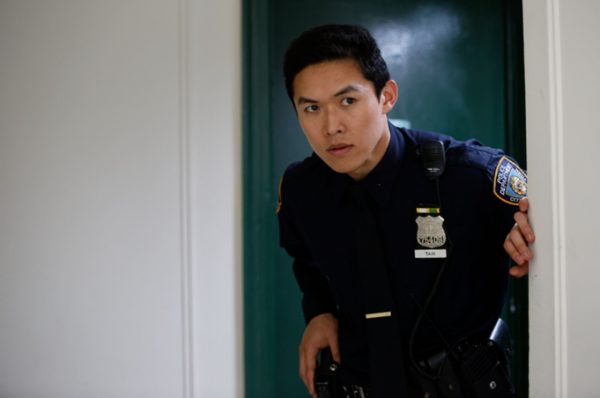A Shot Through the Wall, 2022.
Written and Directed by Aimee Long.
Starring Kenny Leu, Ciara Renée, Tzi Ma, Fiona Fu, Dan Lauria, Clifton Davis, Lynn Chen, Derek Goh, Damian Young, Kelly AuCoin, Michelle Wilson, Dan Lauria, and Catherine Curtin.
SYNOPSIS:
A Chinese-American police officer’s life unravels after he accidentally shoots an innocent Black man. Facing trial, he wades through his guilt as he navigates the complicated worlds of media, justice, racial politics, and his own morality.
There is absolutely a problem with prejudices within law enforcement personnel, racism resulting in intended murder and tragedy, and brokenness regarding mental and physical training structures. No rational person will deny that, including those that enlist to protect because they genuinely care about the communities they serve. Simultaneously, accidents do happen, and considering the mishap here involves the killing of an unarmed and innocent Black man minding his own business behind closed doors during an unrelated chase of a suspect (one that does feel grounded in racism by a white officer), it’s understandable if someone is turned away by fictional Black pain used here to tell a timely story. For those who brave the narrative’s horror and complexities, A Shot Through the Wall (written and directed by Aimee Long, making a presciently gripping narrative debut) is neither exploitative nor a piece of cop propaganda that some might perceive it to be.
Going back to this flawed system, there’s a moment when Chinese-American officer Mike Tan (a nuanced Kenny Leu capable of generating empathy, mainly because the script is not afraid to let him make dumb mistakes not only out of desperation but also ignorance), suspended from the force after the titular incident killing a Black man, has a legitimate reason to feel paranoid as if his life is in danger. Perhaps not the wisest decision; he chooses to purchase a gun where the dealer explains this particular firearm will not go off accidentally. Whether or not this clerk is delivering a subtle dig towards Mike or not (his gun went off while removing it from his holster during a stressful situation inside an apartment complex hallway), it doesn’t matter. Why is this gun (or something resembling it) not the standard for these officers? Perhaps it’s a question of funding, or maybe higher-ups prefer officers to carry looser weapons.
In what could have resulted in forced melodrama, Mike is also dating the Black captain’s Black daughter Canada Walker (Ciara Renée), with both families on the verge of sitting down for an interracial meet-the-parents dinner gathering for the first time. Played by Fiona Fu and Tzi Ma, A Shot Through the Wall also does an admirable job charting the history of these immigrant parents from more traditional and discriminatory to the accepting bunch they appear to be now. It doesn’t all work, as there is a subplot with Mike’s sister hiding a secret from the parents that feels as if it could and should be excised from the narrative entirely without losing much of anything.
Similar to Asghar Farhadi’s masterful A Hero, A Shot Through the Wall uses its central conceit to explore social media influence and how they can be persuaded by publicity stunts and the media (a compelling section of the movie involves Mike and Canada deciding if they want to do a joint interview as a shield to some of the racism accusations). Of course, the family’s grief also remains present, with Mike also needing to accept his accountability.
There’s also the fact that malicious intent or mistake, rarely are these cops ever dramatically held accountable. Mike is even told not to testify and assured from the beginning that this will all blow over. Naturally, that doesn’t happen. He gets indicted, and it becomes evident that a corrupt legal system aims to use a Chinese-American to make a punishment example for all of these accidents in favor of bringing the hammer down on white colleagues. It’s a dynamic that allows A Shot Through the Wall to function as morally gray, something delicately complicated to observe and take in, leading to a stirring ending that’s predictable in some respects but logical, believable, and heartbreaking. If the film had paid attention to and given more material for its Black victims, this could have been truly special. As is, it’s still riveting and relevant, brimming with authenticity.
Flickering Myth Rating – Film: ★ ★ ★ / Movie: ★ ★ ★ ★
Robert Kojder is a member of the Chicago Film Critics Association and the Critics Choice Association. He is also the Flickering Myth Reviews Editor. Check here for new reviews, follow my Twitter or Letterboxd, or email me at MetalGearSolid719@gmail.com














